一般现在时基本用法介绍及练习
一般现在时的讲解以及练习题

【强调勉强够数;】4、hardly[英][ˈhɑ:dli]简直不,几乎不,几乎没有【=almost not,强调困难.程度次于seldom】scarcely[英][ˈskeəsli][美][ˈsk ersli]adv.几乎不,简直不【scarely=hardly ,用在be/助动词后,强调数量和程度的不足】5、always[ˈɔ:lweɪz]adv.总是,永远,常常;【程度最强】6、usually adv.通常,经常,平常;一般;【程度稍次于always】7、often [ˈɔ:fn]多次,时常,【程度次于usualy】8、sometimes[ˈsʌmtaɪmz]有时,【程度次于often】三、一般现在时的用法※★(一)、肯定句★※★1、句中有系动词be的一般现在时构成★主语+be+其它The girl is my friend. 这个女姟是我的朋友。
※Be包括am,is,are。
句中有be这个动词时,如果主语是第一人称单数I时要be用am;主语是第三人称单数he,she,it时be要用is;主语是其他形式,即you,we,they 时be要用are。
例:I am a student.我是一名学生。
We are students.我们是学生。
You are very beautiful.他们很美丽。
She is my best friend.她是我最好的朋友。
Kitty is an English girl.基蒂是一名英国女孩。
The bag is mine. 这个书包是我的。
Lucy and lily are good friend.露西和丽丽是好朋友。
★2、句中有情态动词的一般现在时★构成:主语+情态动词+动词原形+其它She can speak English.她会说英语。
He can do his homework by himself.他自己能做家务。
★3、句中是行为动词的一般现在时★(1)构成:主语+行为动词+其他These boys like playing football.这些男孩子喜欢玩足球。
一般现在时讲解及练习
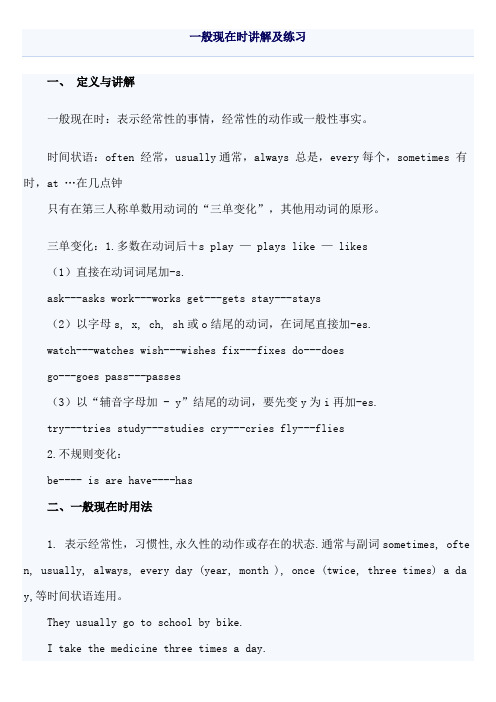
一、定义与讲解一般现在时:表示经常性的事情,经常性的动作或一般性事实。
时间状语:often 经常,usually通常,always 总是,every每个,sometimes 有时,at …在几点钟只有在第三人称单数用动词的“三单变化”,其他用动词的原形。
三单变化:1.多数在动词后+s play — plays like — likes(1)直接在动词词尾加-s.ask---asks work---works get---gets stay---stays(2)以字母s, x, ch, sh或o结尾的动词,在词尾直接加-es.watch---watches wish---wishes fix---fixes do---doesgo---goes pass---passes(3)以“辅音字母加 - y”结尾的动词,要先变y为i再加-es.try---tries study---studies cry---cries fly---flies2.不规则变化:be---- is are have----has二、一般现在时用法1. 表示经常性,习惯性,永久性的动作或存在的状态.通常与副词sometimes, ofte n, usually, always, every day (year, month ), once (twice, three times) a da y,等时间状语连用。
They usually go to school by bike.I take the medicine three times a day.She helps her mother once a week.Mary’s father is a policeman.There are 50 students in my class.2. 表示客观真理,科学原理,自然现象,等客观事实或格言,谚语等。
The sun rises in the east and sets in the west every day.The man who has never been to the Great Wall is not a real man.Tomorrow is Tuesday.三、一般现在时的句子转换:(1)当句子中有be动词或情态动词时,则把be动词或情态动词(can,could等等)提到主语的前面变成疑问句;在be动词或情态动词后面加not变成否定句.例:①陈述句:She is a student.疑问句→ Is she a student?否定句→ She is not a student.②陈述句:I can swim.疑问句→ Can you swim否定句→ I can not swim.(2)当句子中即没有be动词,也没有情态动词时,则在主语前加助动词do (you,以及复数), does(单数she,he,it)变成问句;在主语后谓语动词前加助动词don’t(I, you,以及复数), doesn’t(单数she,he,it)变成否定句,助动词后的动词要变成动词原形。
英语一般现在时语法及练习题

英语一般现在时语法及练习题英语一般现在时语法及练习题在日常学习和工作中,我们很多时候都会有考试,接触到练习题,做习题在我们的学习中占有非常重要的位置,对掌握知识、培养能力和检验学习的效果都是非常必要的,你所见过的习题是什么样的呢?下面是店铺为大家整理的英语一般现在时语法及练习题,仅供参考,大家一起来看看吧。
英语一般现在时语法及练习题1现在一般时(present tense)概念:表示通常性、规律性、习惯性、真理性的状态或者动作(有时间规律发生的事件)的一种时间状态。
常用结构:1.主语+谓语+其他(表动作)It never snows in Australia in December.澳大利亚的12月里从来不下雪。
They usually go to school by bike.他们通常骑自行车上学。
He writes to his father twice a month.他每月写两次信给他爸爸。
2.主语+be+表语(表状态)He is a student.他是学生。
ⅠBe动词的一般现在时主语+be(am , is , are)+其它肯定句式:主语+be( am, is, are)+其它. 如,The color is blue.否定句式:主语+be(am, is, are) +not +其它.如,The color is not blue.一般疑问句:Be(am, is, are) +主语+其它?.注:在这种构成中,be动词有人称和数的变化,即要根据主语选用am / is / are。
Be动词分为单数和复数,am和is是表示单数,am只跟I搭配(除了I其余的单数都用is),are表示复数。
Ⅱ 实义动词的.一般现在时① 主语(第三人称单数)+动词(第三人称单数形式)+其它肯定句式:主语(第三人称单数)+动词(第三人称单数形式)+其它,如,He likes it否定句式:主语(第三人称单数)+doesn’t+动词(原形)+其它.如:He dosen't like it.一般疑问句:Does+主语(第三人称单数)+动词(原形)+其它? Does he like it?② 主语(除了第三人称单数)+动词(原形)+其它肯定句式:主语(除了第三人称单数)+动词(原形)+其它如:I like it 否定句式:主语(除了第三人称单数)+don’t+动词(原形)+其它.如:I don't like it.一般疑问句:Do+主语(除了第三人称单数)+动词(原形)+其它? Do you know it.注:do、don’t和does、doesn’t是构成一般现在时的助动词,其特点是要在其后跟动词的原形。
一般现在时的用法及例句

一般现在时的用法及例句含义:一般现在时可表示现在的状态,还可表示经常的或习惯性的动作,亦可表示主语具备的性格和能力等。
谓语动词在一般现在时中的使用情况:1. be动词连系动词be是表示谓语关系的动词,它的后面必须加表语(通常为名词形容词或介词短语)。
在一般现在时中be动词有三种形式,am(用在第一人称单数,即I之后),is(用在第三人称单数,即he, she, it后), are(用在第二人称you以及第一、三人称复数we, they后)。
含有be 动词的一般现在时的疑问句是将be动词提到句首,否定句是在be动词后加not。
eg:1. I am a student.Are you a student? Yes, I am. No, I'm not.I'm not a student.2. You are a good doctor.Are you a good doctor? Yes, I am. No, I'm not.You aren't a good doctor.3. He/ She is my teacher.Is he /she your teacher? Yes, he /she is. No, he /she isn't.He /She isn't my teacher.4. It's my dog.Is it your dog? Yes, it is. No, it isn't.It isn't my dog.5. We are good friends.Are you good friends? Yes, we are. No, we aren't.We aren't good friends.6. They are my brothers.Are they your brothers? Yes, they are. No, they aren't.They aren't my brothers.在口语中经常使用的缩略形式如下:肯定式: I'm= I am you're= you are he's= he is she's= she is it's =it is we're= we are they're= they are否定式: aren't= are not isn't =is not其他: that's =that is what's= what is who's= who is who're= who arewhere's= where is my name's= my name is2.实意动词do实意动词是表示动作或状态的词。
小学生一般现在时讲解及练习题
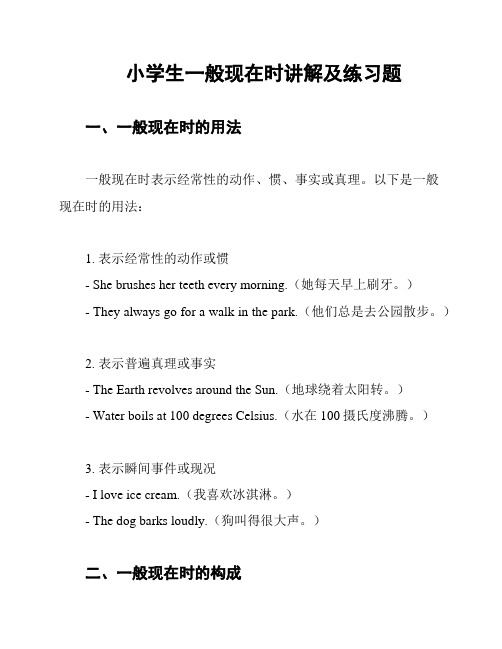
小学生一般现在时讲解及练习题一、一般现在时的用法一般现在时表示经常性的动作、惯、事实或真理。
以下是一般现在时的用法:1. 表示经常性的动作或惯- She brushes her teeth every morning.(她每天早上刷牙。
)- They always go for a walk in the park.(他们总是去公园散步。
)2. 表示普遍真理或事实- The Earth revolves around the Sun.(地球绕着太阳转。
)- Water boils at 100 degrees Celsius.(水在100摄氏度沸腾。
)3. 表示瞬间事件或现况- I love ice cream.(我喜欢冰淇淋。
)- The dog barks loudly.(狗叫得很大声。
)二、一般现在时的构成在一般现在时中,动词的变化相对简单。
1. 对于第三人称单数(He/She/It),动词要加-s或-es。
- He walks to school every day.(他每天走路去学校。
)- She eats an apple.(她吃一个苹果。
)- It runs fast.(它跑得很快。
)2. 对于其他人称(I/You/We/They),动词不变。
- I play soccer on weekends.(我周末踢足球。
)- You read books every night.(你每晚读书。
)- We go swimming in summer.(我们夏天去游泳。
)- They watch movies together.(他们一起看电影。
)三、练题请根据句意填入正确的动词形式。
1. My mother __________ (cook) dinner for us every evening.2. Tom and Lisa __________ (play) tennis on Saturdays.3. The sun __________ (rise) in the east.4. We __________ (study) English at school.5. Dogs __________ (bark) when they see strangers.1. cooks2. play3. rises4. study5. bark希望以上讲解和练习题对你有帮助!。
c初中英语一般现在时的用法和练习题

c初中英语一般现在时的用法和练习题一般现在时是英语中最基本的时态之一,用来描述经常发生的动作或存在的状态。
以下是一般现在时的用法和一些练习题,帮助学生更好地理解和运用这一时态。
# 一般现在时的用法:1. 描述日常习惯或规律性动作:例如,I usually wake up at 7 a.m.(我通常早上7点醒来)。
2. 表达客观事实或普遍真理:例如,The Earth revolves aroundthe Sun.(地球绕着太阳转)。
3. 描述永久性特征或状态:例如,Water boils at 100 degrees Celsius.(水在100摄氏度时沸腾)。
4. 用于时间、条件、让步状语从句:例如,If it rains, the match will be postponed.(如果下雨,比赛将被推迟)。
5. 表达命令、请求或建议:例如,Please close the door.(请关门)。
6. 用于某些固定表达:例如,Here comes the bus.(公交车来了)。
# 一般现在时的构成:- 主语 + 动词原形(I, you, we, they):例如,We play soccer every weekend.- 主语 + 动词的第三人称单数形式(he, she, it):例如,She watches TV every night.- 主语 + 动词原形 + 不定冠词 + 名词:例如,A cat sleeps 16 hours a day.# 练习题:1. 填空题:请在括号中填入正确的动词形式。
- My father (work) ______ in a bank.- The sun (rise) ______ in the east and (set) ______ in the west.2. 改错题:找出句子中的错误并改正。
- She don't like to eat vegetables. (正确形式:She doesn't like to eat vegetables.)3. 选择题:选择正确的选项完成句子。
[译林版]小学体育一般现在时用法及习题(含答案)
![[译林版]小学体育一般现在时用法及习题(含答案)](https://img.taocdn.com/s3/m/f02a4792185f312b3169a45177232f60ddcce72a.png)
[译林版]小学体育一般现在时用法及习题
(含答案)
- 一般现在时的基本用法
- 表示现在经常发生的动作
- 表示现在的状态或存在
- 表示客观存在的真理或规律
- 小学体育一般现在时的用法
- 表示动作:我每天锻炼身体。
- 表示状态:他现在是一名优秀的足球运动员。
- 表示真理或规律:运动能增强体质。
- 一般现在时的用法注意点
- 第三人称单数形式需要加 -s,如:He likes swimming.
- 否定句需要加 do not 或 does not,疑问句需要借助 do 或 does。
- 一般现在时经常和副词 always, often, usually, sometimes, seldom, never 等连用。
- 练题
1. 玛丽每天早晨去跑步。
答案:Mary goes for a run every morning.
2. 我们学校的体育课很有趣。
答案:Our school's physical education class is very interesting.
3. 他经常打乒乓球。
答案:He often plays table tennis.
4. 你每周有多少次上体育课?
答案:How many times do you have physical education class each week?
5. 运动会通常在春天举行。
答案:Sports meets are usually held in the spring.
以上就是小学体育一般现在时用法的介绍和练习题及答案,希望可以帮助学生们更好地掌握这种时态。
一般现在时的用法及示例

一般现在时的用法及示例一般现在时是英语中最基本的时态之一,用于描述经常发生的动作、现实存在的情况、不变的真理以及科学事实等。
本文将详细介绍一般现在时的使用规则,并给出相应的示例。
一、一般现在时的基本形式一般现在时的动词形式为原形,即不带任何时态标志的动词。
它适用于第三人称单数和其他人称的主语。
示例:1. I eat dinner at 7 PM every day.(我每天晚上7点吃饭。
)2. She walks to work every morning.(她每天早上步行去上班。
)3. They play basketball on Saturdays.(他们每个星期六打篮球。
)二、一般现在时的用法1. 描述经常性的动作或习惯一般现在时常用于描述经常发生的动作或习惯,表示事件的惯常性。
示例:1. He usually drinks coffee in the morning.(他通常早上喝咖啡。
)2. We often go to the park on weekends.(我们经常在周末去公园。
)3. Mary always reads books before going to bed.(玛丽睡觉前总是看书。
)2. 表示现实存在的情况一般现在时还用于描述现实存在的情况,即事实或状态。
示例:1. The sun rises in the east.(太阳从东方升起。
)2. Water boils at 100 degrees Celsius.(水在100摄氏度沸腾。
)3. Dogs are loyal animals.(狗是忠诚的动物。
)3. 表示客观真理或普遍事实一般现在时还可以用于表达客观真理或普遍事实,即通常情况下普遍适用的陈述句。
示例:1. The Earth revolves around the sun.(地球绕太阳旋转。
)2. Plants need sunlight to grow.(植物需要阳光才能生长。
一般现在时态讲解及练习(精简版,错题版)

一般现在时态一、一般现在时的用法1) 表示经常性、习惯性的动作或存在的状态。
通常与副词sometimes, often, usually, always, everyday (year, month ), once (twice, three times) a day, 等等频率副词(时间状语)连用。
e.g. They usually go to school by bike.I take the medicine three times a day. 实义动词表示“动作”She helps her mother once a week.Mary’s father is a policeman.There are 50 students in my class. Be动词表示“状态”He is very busy now.be 、do不能放一起,如果非要放一起,do后要加ing, 变成现在进行时。
2) 表示主语的特征、性格、爱好等。
e.g. I work hard.I like watching TV.3) 表示客观真理e.g. There are seven days in a week.The moon moves round the earth.The sun rises in the east and sets in the west every day.Tomorrow is Tuesday.二、一般现在时的句子转换:三、一般现在时的结构:“主语+谓语+其它”,有时为了起强调作用,时间状语也可提前.三单变化:1)多数在动词后+s :play — plays like — likes ask---asks work---works get---gets stay---stays 2)以字母s, x, ch, sh或o结尾的动词,+-es:watch---watches wish---wishes fix---fixes do---does go---goes pass---passes 3)以“辅音字母加- y”结尾的动词,要先变y为i+-es.try---tries study---studies cry---cries fly---flies不规则变化:be---- is are have----has做题时常见错误如下:1)、be动词与行为动词同时出现在句子中例:We are plant (plant) the trees in spring.答案:plant2)、单三人称形式易出错例:1 He plaies (play) football very well.2 Danny gos (go) to school at 7:10.答案:1 plays 2 goes解析:1以辅音字母加y结尾的动词变单三人称形式才能把y换成i再加es;2与名词变复数不同,变单三人称形式以o结尾的词要加es.3)、在句式变换时易出错例:1 Does Jenny has (has) a good friend?2 Brian doesn’t lives (not live) in China.答案:1 Does have 2 doesn’t live解析:口诀:“见助动,用原形”。
一般现在时的定义-构成-用法及练习题解析。
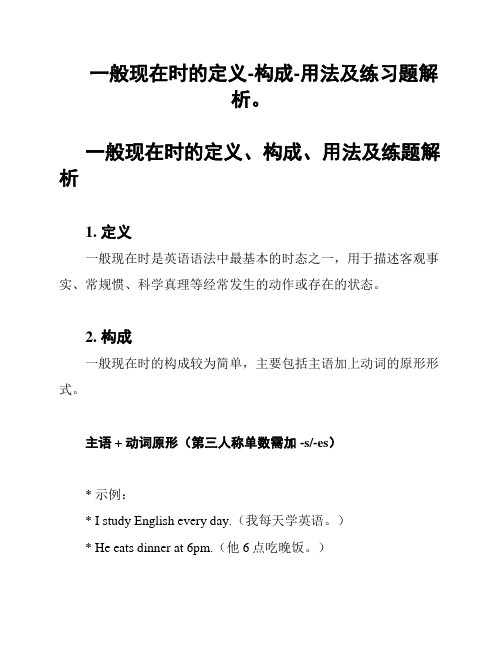
一般现在时的定义-构成-用法及练习题解析。
一般现在时的定义、构成、用法及练题解析1. 定义一般现在时是英语语法中最基本的时态之一,用于描述客观事实、常规惯、科学真理等经常发生的动作或存在的状态。
2. 构成一般现在时的构成较为简单,主要包括主语加上动词的原形形式。
主语 + 动词原形(第三人称单数需加 -s/-es)* 示例:* I study English every day.(我每天学英语。
)* He eats dinner at 6pm.(他6点吃晚饭。
)3. 用法一般现在时的用法如下:3.1 描述客观事实一般现在时常用于描述客观的事实、真理或普遍存在的情况。
* 示例:* The sun rises in the east.(太阳从东方升起。
)* Water boils at 100 degrees Celsius.(水在100摄氏度时煮沸。
)3.2 表达惯性动作一般现在时还用于表达惯性动作或经常发生的动作。
* 示例:* I usually go jogging in the morning.(我通常在早上慢跑。
)* They always drink coffee after lunch.(他们午饭后总是喝咖啡。
)3.3 表示基本真理一般现在时还可以用于表示基本真理或普遍的规律。
* 示例:* The Earth revolves around the sun.(地球绕着太阳转。
)* Plants need sunlight to grow.(植物需要阳光来生长。
)4. 练题解析以下是一些关于一般现在时的练题及其解析:练题1:选择正确的答案填空。
1. Water ___ at 100 degrees Celsius.- A. boils- B. will boil- C. boiled解析:正确答案是 A。
根据一般现在时的规则,原形动词"boils" 在句中符合一般现在时的用法。
一般现在时的专项训练及答案

一般现在时的专项训练及答案一、什么是一般现在时一般现在时是英语中最基本、最常用的时态之一。
它用来表示经常性的行为、习惯、客观事实以及普遍真理等。
在句子中,一般现在时通常以动词的原形出现。
二、一般现在时的用法1. 表示经常性的行为和习惯•I go to the gym every morning.(我每天早上去健身房。
)•She usually drinks coffee in the afternoon.(她通常下午喝咖啡。
)2. 表示客观事实•The sun rises in the east.(太阳从东方升起。
)•Water boils at 100 degrees Celsius.(水在100摄氏度时沸腾。
)3. 表示普遍真理•Cats chase mice.(猫追逐老鼠。
)•The earth revolves around the sun.(地球围绕太阳公转。
)4. 表示固定的计划或安排•The train leaves at 8 o’clock.(火车在8点离开。
)•The concert starts at 7:30 PM.(音乐会在晚上7点半开始。
)三、一般现在时的构成一般现在时的肯定句结构为:主语 + 动词(原形)+ 其他。
一般现在时的否定句结构为:主语 + do/does + not + 动词(原形)+ 其他。
一般现在时的疑问句结构为:Do/Does + 主语 + 动词(原形)+ 其他?四、一般现在时的专项训练请按照要求完成以下句子,并选择正确的答案。
1.He __________ football every Sunday morning.a)playb)playsc)playedd)playing2.We usually __________ dinner at 7 PM.a)haveb)hasc)hadd)having3.__________ she __________ to the cinema often?a)Do, gob)Does, goc)Do, goesd)Does, goes4.My parents __________ in the countryside.a)liveb)livesc)livedd)living5.__________ you __________ English every day?a)Do, studyb)Does, studyc)Do, studiesd)Does, studies五、一般现在时的答案b)playsa)haveb)Does, goa)livea)Do, study六、总结通过以上的训练,我们可以更好地理解和使用一般现在时。
一般现在时基本用法介绍及练习
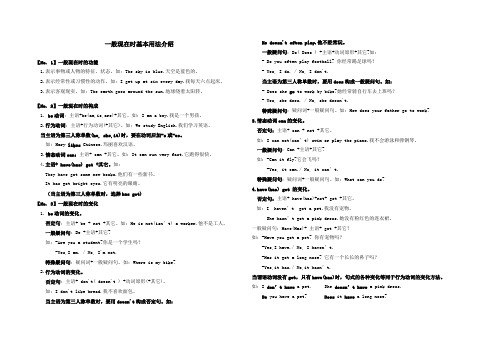
一般现在时基本用法介绍【No. 1】一般现在时的功能1.表示事物或人物的特征、状态。
如:The sky is blue.天空是蓝色的。
2.表示经常性或习惯性的动作。
如:I get up at six every day.我每天六点起床。
3.表示客观现实。
如:The earth goes around the sun.地球绕着太阳转。
【No. 2】一般现在时的构成1. be动词:主语+be(am,is,are)+其它。
如:I am a boy.我是一个男孩。
2.行为动词:主语+行为动词(+其它)。
如:We study English.我们学习英语。
当主语为第三人称单数(he, she,it)时,要在动词后加-s或-es。
如:Mary likes Chinese.玛丽喜欢汉语。
3.情态动词can:主语+ can +其它。
如:It can run very fast.它跑得很快。
4.主语+ have(has) got +其它。
如:They have got some new books.他们有一些新书。
It has got bright eyes.它有明亮的眼睛。
(当主语为第三人称单数时,选择has got)【No. 3】一般现在时的变化1. be动词的变化。
否定句:主语+ be + not +其它。
如:He is not(isn’t) a worker.他不是工人。
一般疑问句:Be +主语+其它?如:-Are you a student?你是一个学生吗?-Yes,I am. / No, I'm not.特殊疑问句:疑问词+一般疑问句。
如:Where is my bike?2.行为动词的变化。
否定句:主语+ don't( doesn't ) +动词原形(+其它)。
如:I don't like bread.我不喜欢面包。
当主语为第三人称单数时,要用doesn't构成否定句。
(完整版)初中一般现在时用法及练习

一般现在时专题讲解1.概念:一般现在时表示经常的、习惯性的动作或存在的状态一般现在时表示现在经常反复发生的动作、存在的状态或习惯性的动作的时态。
可概括为①经常性或习惯性动作;②长期存在的特征或状态;③普遍真理、客观事实等。
2.构成:一般现在时的构成主要有两种形式,一般现在时用行为动词的原形,但第三人称单数作主语时,动词的词尾要加-S。
:(1)be型:句子的谓语动词只有be(am,is或are):a.肯定句中,只出现be,如: I am a student.我是一名学生。
.她不是教师。
b.否定句中,要在be后面加not,如: She isn't a teacherc.一般疑问句,要将be放在句子开头(注意句首字母大写),句尾用问号,答语用Yes,主语+be.或No,主语+be+not.如:—Are you ready?—你准备好了吗?—Yes,I am.—是的,我准备好了。
(—No,I'm not.—不,我没准备好。
)(2)实义动词型:句中的谓语动词为实义动词(也叫行为动词):a.肯定句中,只出现实义动词,如: I get up in the morning.我早晨起床。
b.否定句中,要在实义动词前面加do(does)+not,do(does)作助动词,本身无意义,常与not缩写成don't(doesn't),如: I don't like vegetables.我不喜欢蔬菜。
c.一般疑问句,要在句子开头加助动词Do(does),句尾用问号,简略答语用Yes,主语+do(does).或No,主语+do (does)+not.如:—Do you like oranges?—你喜欢桔子吗?—Yes,I do.—是的,我喜欢。
(—No,I don't.—不,我不喜欢。
)3, 一般现在时的用法, always,1) 经常性或习惯性的动作,常与表示频率的时间状语连用。
小学英语一般现在时知识点全面讲解附练习及答案
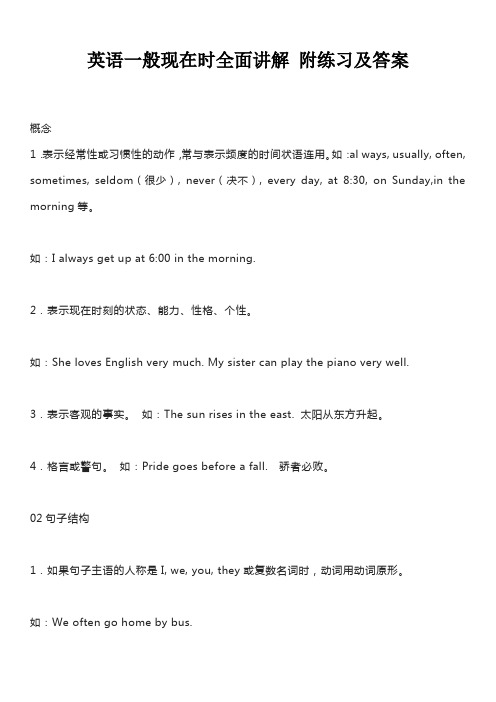
英语一般现在时全面讲解附练习及答案概念1.表示经常性或习惯性的动作,常与表示频度的时间状语连用。
如:al ways, usually, often, sometimes, seldom(很少), never(决不), every day, at 8:30, on Sunday,in the morning等。
如:I always get up at 6:00 in the morning.2.表示现在时刻的状态、能力、性格、个性。
如:She loves English very much. My sister can play the piano very well.3.表示客观的事实。
如:The sun rises in the east. 太阳从东方升起。
4.格言或警句。
如:Pride goes before a fall. 骄者必败。
02句子结构1.如果句子主语的人称是I, we, you, they或复数名词时,动词用动词原形。
如:We often go home by bus.2.如果句子的主语是第三人称单数,即:he, she, it 或单数名词时,动词要用第三人称的单数形式。
如:He often goes home by bus03动词的第三人称单数构成规则1.一般情况下在动词的后面直接加“s”;如:work→works play→plays¬ rain→rains see→sees visit→visits2.以o, x,s,sh, ch结尾的动词,在后面加“es”;如:do→does fix→fixes guess→guesses wash→washes teach→teaches3.以辅音字母加y结尾的动词,先把“y”改为“i”, 再加“es”;如:fly→flies study→studies carry→carries4.不规则变化。
如:have→has04注意在一般现在时的句子中,如果前面使用了助动词does, doesn’t, will, won’t, can, can’t, would, wouldn’t, must, mustn’t 等,尽管主语是第三人称单数,后面的动词用动词原形。
一般现在时的讲解及习题
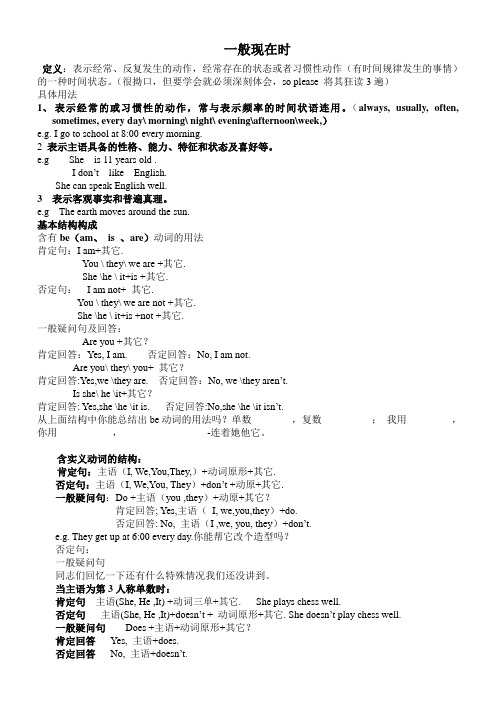
一般现在时定义:表示经常、反复发生的动作,经常存在的状态或者习惯性动作(有时间规律发生的事情)的一种时间状态。
(很拗口,但要学会就必须深刻体会,so please 将其狂读3遍)具体用法1、表示经常的或习惯性的动作,常与表示频率的时间状语连用。
(always, usually, often,sometimes, every day\ morning\ night\ evening\afternoon\week,)e.g. I go to school at 8:00 every morning.2 表示主语具备的性格、能力、特征和状态及喜好等。
e.g She is 11 years old .I don’t like English.She can speak English well.3表示客观事实和普遍真理。
e.g The earth moves around the sun.基本结构构成含有be(am、is 、are)动词的用法肯定句:I am+其它.You \ they\ we are +其它.She \he \ it+is +其它.否定句:I am not+ 其它.You \ they\ we are not +其它.She \he \ it+is +not +其它.一般疑问句及回答:Are you +其它?肯定回答:Yes, I am. 否定回答:No, I am not.Are you\ they\ you+ 其它?肯定回答:Yes,we \they are. 否定回答:No, we \they aren’t.Is she\ he \it+其它?肯定回答: Yes,she \he \it is. 否定回答:No,she \he \it isn’t.从上面结构中你能总结出be动词的用法吗?单数________,复数_________ ;我用_________,你用__________ ,______________-连着她他它。
(完整版)一般现在时的讲解及练习题
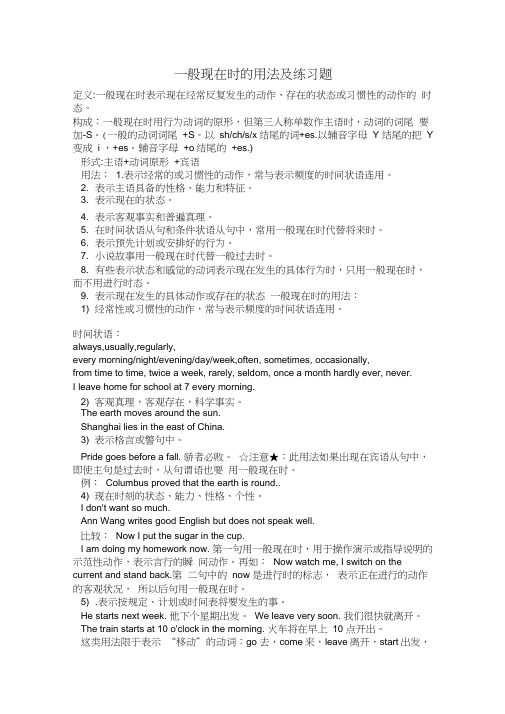
一般现在时的用法及练习题定义:一般现在时表示现在经常反复发生的动作、存在的状态或习惯性的动作的时态。
构成:一般现在时用行为动词的原形,但第三人称单数作主语时,动词的词尾要加-S。
(一般的动词词尾+S。
以sh/ch/s/x结尾的词+es.以辅音字母Y 结尾的把Y 变成i ,+es。
辅音字母+o结尾的+es.)形式:主语+动词原形+宾语用法: 1.表示经常的或习惯性的动作,常与表示频度的时间状语连用。
2. 表示主语具备的性格、能力和特征。
3. 表示现在的状态。
4. 表示客观事实和普遍真理。
5. 在时间状语从句和条件状语从句中,常用一般现在时代替将来时。
6. 表示预先计划或安排好的行为。
7. 小说故事用一般现在时代替一般过去时。
8. 有些表示状态和感觉的动词表示现在发生的具体行为时,只用一般现在时,而不用进行时态。
9. 表示现在发生的具体动作或存在的状态一般现在时的用法:1) 经常性或习惯性的动作,常与表示频度的时间状语连用。
时间状语:always,usually,regularly,every morning/night/evening/day/week,often, sometimes, occasionally,from time to time, twice a week, rarely, seldom, once a month hardly ever, never.I leave home for school at 7 every morning.2) 客观真理,客观存在,科学事实。
The earth moves around the sun.Shanghai lies in the east of China.3) 表示格言或警句中。
Pride goes before a fall. 骄者必败。
☆注意★:此用法如果出现在宾语从句中,即使主句是过去时,从句谓语也要用一般现在时。
例:Columbus proved that the earth is round..4) 现在时刻的状态、能力、性格、个性。
一般现在时的基本用法及练习
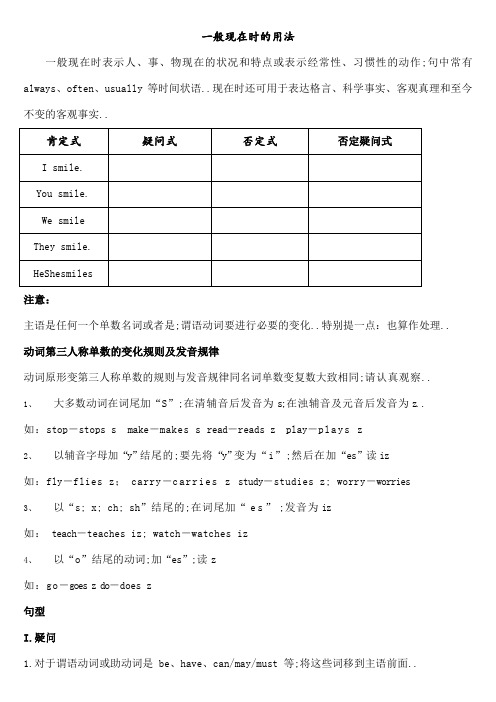
一般现在时的用法一般现在时表示人、事、物现在的状况和特点或表示经常性、习惯性的动作;句中常有always、often、usually等时间状语..现在时还可用于表达格言、科学事实、客观真理和至今不变的客观事实..注意:主语是任何一个单数名词或者是;谓语动词要进行必要的变化..特别提一点:也算作处理..动词第三人称单数的变化规则及发音规律动词原形变第三人称单数的规则与发音规律同名词单数变复数大致相同;请认真观察..1、大多数动词在词尾加“S”;在清辅音后发音为s;在浊辅音及元音后发音为z..如:stop-stops s make-makes s read-reads z play-plays z2、以辅音字母加“y”结尾的;要先将“y”变为“i”;然后在加“es”读iz如:fly-flies z; carry-carries z study-studies z; worry-worries3、以“s; x; ch; sh”结尾的;在词尾加“e s”;发音为iz如: teach-teaches iz; watch-watches iz4、以“o”结尾的动词;加“es”;读z如:go-goes z do-does z句型I.疑问1.对于谓语动词或助动词是 be、have、can/may/must 等;将这些词移到主语前面..Are you studentsYes; we are. / No; we aren't.你们是一名学生吗是的..我们是一名学生../不;我们不是..Is Jane in the classroom Yes; she is. / No; she isn't.简在这个教室里面吗是的;她在../不;她不在..Does the house have two rooms Yes; it does / No; it doesn't.这栋房子里面有两个房间吗是的/不;不是..Is there any water in the glass Yes; there is. / No; there isn't.杯子里面有水吗是的;有../不;没有..Can you swim Yes; I can. / No; I can't.你会游泳吗是的;我会../不;我不会..2.谓语动词是实义动词;方法是在主语前加助动词do或does构成;句中动词要改用原型动词..用于第一人称和名词复数;does用于第三人称单数和名词单数或不可数名词..Do you know itYes; I do. / No; I don't.你知道这个吗是的;我知道/不;我不知道..Does she have a penYes; she does. / No; she doesn't.have 这里是实义动词她有一个钢笔吗Do they play basketball after school Yes; they do. / No; they don't.他们放学后打篮球吗II. 否定1. 对于谓语动词或助动词是 be、have、can/may/must 等;后面直接加not..I am not at college.我不在上大学..Mr. Wang isn't 50 years old.王先生不是50岁..The Jacksons have not two sons.贾克森没有两个儿子..You may not go now.你现在不可能去了..2.谓语动词是;是在谓语动词前加do not 或does not;谓语动词改用动词原型..I don't have lunch at home.我在家没有吃午餐..They don't play basketball on the sportsground.他们不在运动场上打篮球..Mr.Jimmy doesn't know French.吉米先生不会法语..一般现在时用来表示经常的或习惯性的动作;常与以下的时间状语连用:often 经常;always 总是;sometimes 有时;usually 通常;every day/ week 每天/ 周等..He/She usually goes to school by bike. 通常他/她骑车上学..I visit my grandparents every week. 我每个星期都去看祖父母..He/She is always late for class. 他/她总是上课迟到..My parents and I sometimes go out to eat. 我和父母有时出去吃饭..It often rains here. 这儿常常下雨..一般现在时用法专练AⅠ.用括号内动词的适当形式填空..1. He often have dinner at home.2. Daniel and Tommy be members of the Reading Club.3. She and I takea walk together every evening.4. There be some water in the bottle.5. We not watch TV on weekdays.6. Nick not do his homework on Sundays.7. they like the World Cup8. What they usually do on holidays9. your parents read newspapers every day10. The girl teach us English on Sundays.Ⅱ.按照要求改写句子..1. Daniel watches TV every evening. 改为否定句Daniel TV every evening.2. I do my homework every day. 改为一般疑问句并作否定回答—— you homework every day——No; I .3. She likes milk.改为一般疑问句并作肯定回答—— she milk—— Yes; she .4. Simon is from Beijing. 同义句改写Simon Beijing.5. Millie is clever at math. 同义句改写Millie math.Ⅲ.改错..1. Is you brother speak EnglishA B C2. Does he looks like his fatherA B C3. He likes play games after class.A B C4. Mr. Wu teachs us English.A B C 5….She doesn’t her homework on Sundays.A B C Ⅳ.将下列句子译成英文..1._桑迪放学后打羽毛球吗不.她学习很用功.放学后她总是看书.._ Sandy badminton after schoolNo. She hard. She always books after school.2.他在第三中学上学.他每天早上七点上学.He in No .3 Middle School. He to school at 7a.m.every day .3.父亲早晨送我到学校.My father me to school in the morning.4. 我女儿喜欢看电视和听音乐..My daughter TV and to music.5. 西蒙朋友的姐姐长大后想当一位歌手.Simon’s friend’s sister to a singer when she up.B1. 按要求改写下列句子.1、Sandy has long hair in a ponytail. 改为一般疑问句并作肯定回答Sandy long hair in a ponytailYes; .2、Simon and Daniel are good friends .改为否定句Simon and Daniel ______ good friends.3、We are in the school football team. 改为一般疑问句并作肯定回答you in the school football team Yes; ..4、Amy likes playing computer games. 改为一般疑问句并作否定回答________ Amy ________ playing computer games No; ________ ________.5、We go to school every morning . 改为否定句We ________ ________ to school every morning.6、She is always ready to help others. 改为一般疑问句并作否定回答________ she always ready to help others No; ________ ________.7、 The earth goes around the sun. 改为一般疑问句并作肯定回答________ the earth ________ around the sun Yes; ________ ________.8、He speaks English very well. 改为否定句He ________ speak English well.9、John comes from Canada.对划线部分提问Where ________John ________ from10、I like taking my dog for a walk after supper.What ________ you ________ ________ after supper .二. 改错1. Lily and Lucy doesn’t want to clean the blackboard.2. Mr. Green likes work in China very much.3. My mother often go to the shop on Sundays.4. She doesn’t likes bread or cakes.5. Where is Jim and Kate now6. There are some water and leaves in the pool.7. Please give a color pencil for me.8. They aren’t go to school at the weekend.9. The dog sits between the chair.10. She often works hard and goes to bed in night.11. Millie is good in English. She speaks English well.12. She is a member at the Computer Club.13. Do you help your mother in the housework14. Do Simon often go home by a bus .15. I often take bus to school.16. Do you want to play with us after the school17. Daniel and David want to play on us.18. There is a lots of water in the bottle.19. Wendy has much friends in class.20. There are so lots of people in the hall.C一用所给动词正确形式填空1. He loves ______________ read newspaper.2. Nick goes ______________ swim every Saturday afternoon.3. Simon enjoys______________ play football.4. Mr. Mu likes ______________ walk after school.5. Amy likes ______________ talk on the phone with her friends.6. Simon usually goes ______________ run for half an hour.7. Sandy enjoys ______________ look for things on the Internet.8. I don’t like ______________ dance.9. Eric is a member of the ______________ read Club.10. It’s a fine day. What about ______________ play badminton in the park二用适当的介词填空1. I go to school _________ my friends.2. Daniel is clever _______English.3. Millie takes Eddie _________a walk every afternoon..4. Kitty lives _________a flat _________Beijing.5. Sandy sits _________Kitty and Amy.6. Here is a picture _________my family. Do you want to look _________it7. Does Simon often eat _________a restaurant8. _________ the weekend; Wendy and Kitty play tennis _________an hour.9. Sandy has black hair _________ a ponytail. Kitty has long black hair _________bunches.10. Mr. Smith comes _________ New York. He is American.D1. We often___________play on the playground.2. He _________ get up at six o’clock.3. __________you _________ brush your teeth every morning.4. What do he usually do after school5. Danny study English; Chinese; Math; Science and Art at school.6. Mike sometimes __________ go to the park with his sister.7. At eight at night; she ________ watch TV with his parents.8. ________ Mike________ read English every day9. How many lessons ______your classmate____ have on Monday10. What time ____his mother_________ do the housework改句子1. Do you often play football after school 肯定回答2. I have many books. 改为否定句3. Gao Shan’s sister likes playing table tennis 改为否定句4. She lives in a small town near New York. 改为一般疑问句5. I watch TV every day. 改为一般疑问句6. David has a goal. 改为一般疑问句7. We have four lessons.否定句8. Nancy doesn’t run fast 肯定句9. My dog runs fast.否定句:一般疑问句:10. Mike has two letters for him.一般疑问句:否定句:11. I usually play football on Friday afternoon.否定句:一般疑问句:划线提问12. Su Yang usually washes some clothes on Saturday.否定句:一般疑问句:划线提问:13. Mingming usually waters the flowers every day否定句:一般疑问句:划线提问14. Tom does his homework at home.否定句:一般疑问句:划线提问EI.写出下列动词的第三人称单数形式:1. wash _________ match _______guess______ study______ finish_________ go________ snow______ carry_________2. stop ______ see________ drive ________let_______ carry______ keep_____ join______ find_______ think________ teach______ catch______3. stay _______ begin______ forget_______ forget ______ lie________ die _______run_______ prefer______ give________ ring_______ dance______ hope_______II. 用所给动词的适当形式填空:1.I ________write to you as soon as I _______get to London.2. He doesn’t feel well and ____________ not eat any food this morning.3. He ______ not _______ see me come in; for he ___________ read something with great interest.4. I _________ let you have the book as soon as I _________finish it.5. While we waiting wait for our teacher; a little boy ________run up to us.6. Don’t make a noise. Grandpa __________sleep.。
- 1、下载文档前请自行甄别文档内容的完整性,平台不提供额外的编辑、内容补充、找答案等附加服务。
- 2、"仅部分预览"的文档,不可在线预览部分如存在完整性等问题,可反馈申请退款(可完整预览的文档不适用该条件!)。
- 3、如文档侵犯您的权益,请联系客服反馈,我们会尽快为您处理(人工客服工作时间:9:00-18:30)。
一般现在时基本用法介绍
【No. 1】一般现在时的功能
1.表示事物或人物的特征、状态。
如:The sky is blue.天空是蓝色的。
2.表示经常性或习惯性的动作。
如:I get up at six every day.我每天六点起床。
3.表示客观现实。
如:The earth goes around the sun.地球绕着太阳转。
【No. 2】一般现在时的构成
1. be动词:主语+be(am,is,are)+其它。
如:I am a boy.我是一个男孩。
2.行为动词:主语+行为动词(+其它)。
如:We study English.我们学习英语。
当主语为第三人称单数(he, she,it)时,要在动词后加-s或-es。
如:Mary likes Chinese.玛丽喜欢汉语。
3.情态动词can:主语+ can +其它。
如:It can run very fast.它跑得很快。
4.主语+ have(has) got +其它。
如:
They have got some new books.他们有一些新书。
It has got bright eyes.它有明亮的眼睛。
(当主语为第三人称单数时,选择has got)
【No. 3】一般现在时的变化
1. be动词的变化。
否定句:主语+ be + not +其它。
如:He is not(isn’t) a worker.他不是工人。
一般疑问句:Be +主语+其它?
如:-Are you a student?你是一个学生吗?
-Yes,I am. / No, I'm not.
特殊疑问句:疑问词+一般疑问句。
如:Where is my bike?
2.行为动词的变化。
否定句:主语+ don't( doesn't ) +动词原形(+其它)。
如:I don't like bread.我不喜欢面包。
当主语为第三人称单数时,要用doesn't构成否定句。
如:
He doesn't often play.他不经常玩。
一般疑问句:Do( Does ) +主语+动词原形+其它?如:
- Do you often play football? 你经常踢足球吗?
- Yes, I do. / No, I don't.
当主语为第三人称单数时,要用does构成一般疑问句。
如:
- Does she go to work by bike?她经常骑自行车去上班吗?
- Yes, she does. / No, she doesn't.
特殊疑问句:疑问词+一般疑问句。
如:How does your father go to work?
3.情态动词can的变化。
否定句:主语+ can + not +其它。
如:I can not(can’t) swim or play the piano.我不会游泳和弹钢琴。
一般疑问句:Can +主语+其它?
如:-Can it fly?它会飞吗?
-Yes, it can./ No, it can’t.
特殊疑问句:疑问词+一般疑问句。
如:What can you do?
4.have(has) got 的变化。
否定句:主语+ have(has)+not+ got +其它。
如:I haven’t got a pet.我没有宠物。
She hasn’t got a pink dress.她没有粉红色的连衣裙。
一般疑问句:Have(Has)+ 主语+ got +其它?
如:-Have you got a pet? 你有宠物吗?
-Yes,I have./ No, I haven’t.
-Has it got a long nose? 它有一个长长的鼻子吗?
-Yes,it has./ No,it hasn’t.
当谓语动词没有got,只有have(has)时,句式的各种变化等同于行为动词的变化方法。
如:I don’t have a pet. She doesn’t have a pink dress.
Do you have a pet? Does it have a long nose?
一般现在时专项练习
一、写出下列动词的第三人称单数。
begin ________ go _______ stay ________ make ________
look _________ have_______ pass_______ carry ____
come________ watch______ plant_______ fly ________
study_______ brush________ do_________ teach_______
say_______ get ride stop
二、用括号内动词的适当形式填空。
1.He often ________(have) dinner at home.
2.Daniel and Tommy _______(be) in Class One.
3.We _______(not watch) TV on Monday.
4.Nick _______(not go) to the zoo on Sunday.
5.______ they ________(like) the World Cup?
6.What _______they often _______(do) on Saturdays?
7._______ your parents _______(read) newspapers every day?
8.The girl _______(teach) us English on Sundays.
9.She and I ________(take) a walk together every evening.
10.There ________(be) some water in the bottle.
11.Mike _______(like) cooking.
12.They _______(have) the same hobby.
13.My aunt _______(look) after her baby carefully.
14.You always _______(do) your homework well.
15.I _______(be) ill. I’m staying in bed.
16.She _______(go) to school from Monday to Friday.
17.Liu Tao _______(do) not like PE.
18.The child often _______(watch) TV in the evening.
19.Su Hai and Su Yang _______(have) eight subjects this year.
20.-What day _______(be) it today?
- It’s Saturday.
三、按要求改写句子。
1.Amy likes playing computer games.(改为一般疑问句,并作否定回答)
2.It lives in Africa and Asia.(改为否定句)
3.It has beautiful fur. (改为一般疑问句)
4.Does he likes going fishing? (划出错误的地方,并改正)
5.Mr Wu teachs us Drama. (划出错误的地方,并改正)。
